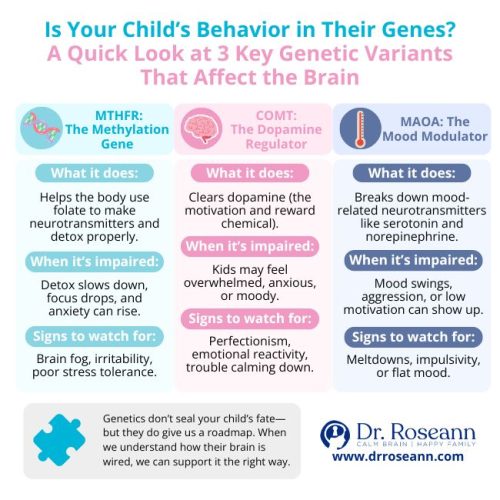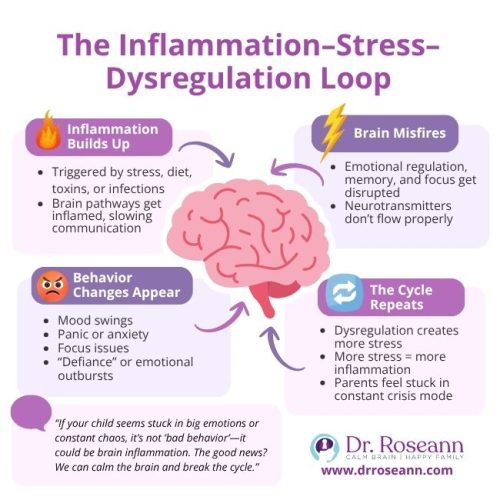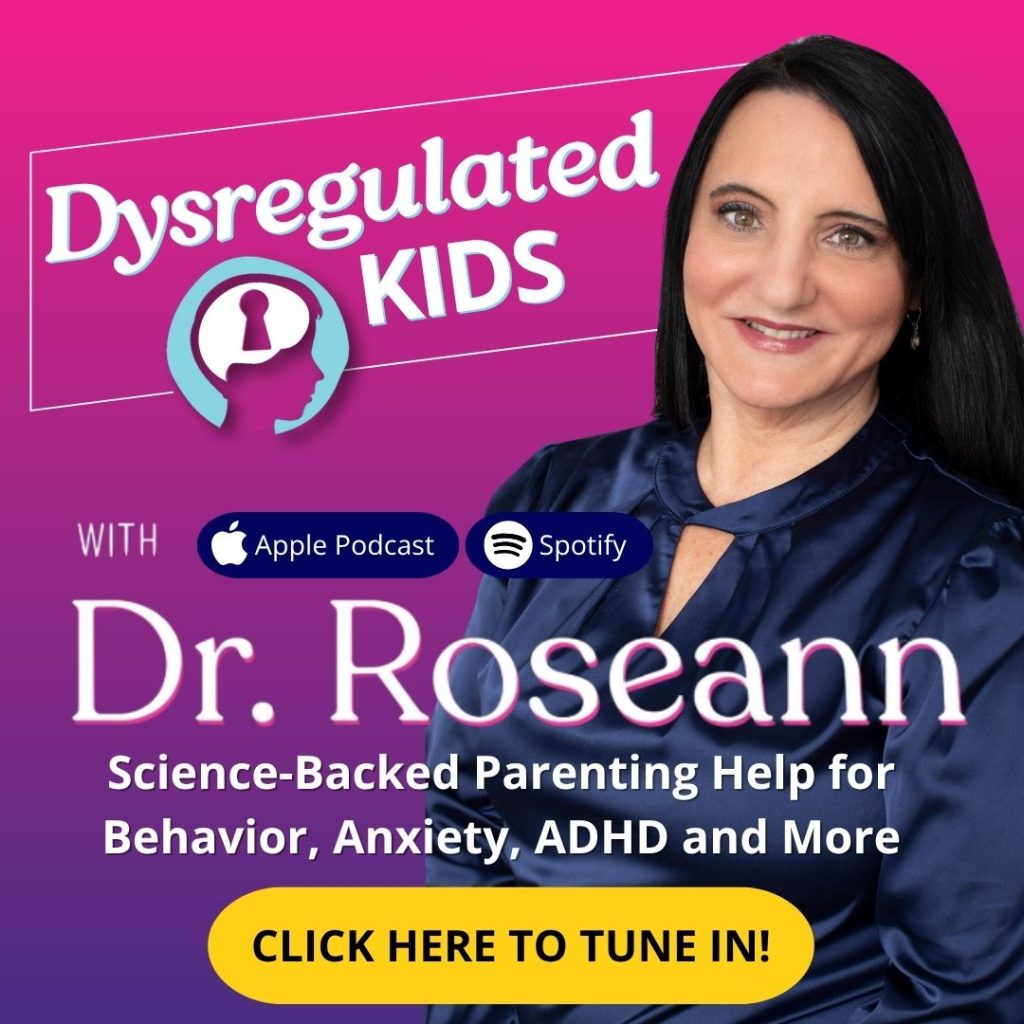Estimated reading time: 8 minutes
If your child’s melting down or mood-swinging like a pinball machine, it’s probably not defiance— among other reasons, it could be biology in the driver’s seat. And let me tell you, I’ve seen this story unfold more times than I can count.
Genetic and biological causes of dysregulation often lie deep within the nervous system—factors we can’t always see, but we can support.
Once we understand the root cause, we stop chasing symptoms—and start calming the brain.
👉 Get the Dysregulation Solution and calm the brain at the source.
How Do Genetics Shape Your Child’s Brain and Behavior?
We now know that many children who struggle with emotional and behavioral regulation carry specific genetic variations that make it harder for their brains to function smoothly.
These aren’t rare mutations—they’re surprisingly common. And they can influence how your child processes brain chemicals, nutrients, and even everyday stress.
So if your child’s mood swings, reactivity, or focus issues don’t seem to budge with therapy or meds—genetics might be the missing piece.
You’re not the only parent seeing these patterns—and it’s not because you’re doing anything wrong. This is biology doing the talking, not bad behavior.
Behavior is the symptom. Brain regulation is the solution.
Let’s walk through a few of the most common genetic variations I see in dysregulated kids—and how they impact emotional control.

What Is the MTHFR Gene—and How Does It Affect Mood and Regulation?
You can think of MTHFR as the brain’s chemical recycling plant. It helps convert folate into its active form—methylfolate—fuel the brain has to have for detox, mood, and neurotransmitter production.
But when a child has an MTHFR variant (like C677T or A1298C), their methylation cycle runs low and slow.
That means even if they eat all the right foods or take a multivitamin, their brain may not be getting the tools it needs to regulate.
You might see:
- Mood swings that seem to come out of nowhere
- Anxiety or panic (Anderson et al., 2016)
- Brain fog or fatigue
- Low frustration tolerance
- Frequent illnesses or poor detox
What this tells us: Their system is overwhelmed. Support the methylation cycle, and you support the brain’s ability to calm and reset.
How Does the COMT Gene Impact Your Child’s Stress and Focus?
Now this one? It’s all about balance.
COMT breaks down stress chemicals like dopamine and norepinephrine. Some kids break them down too slowly, which means dopamine builds up—and they can get edgy, hyper, or anxious.
Others break it down too fast and end up drained, unmotivated, or unable to focus.
So whether your child is always in overdrive or can’t get out of neutral, COMT might be at play.
Watch for:
- Poor stress tolerance
- Big reactions to little things
- Trouble focusing or staying motivated
- Sensitivity to stimulation (especially at night)
Why this matters: Kids with COMT issues often need more support calming the nervous system and replenishing dopamine.
When we calm the brain first, everything else can start to shift.
Can the MAOA Gene Explain Your Child’s Mood?
MAOA is the clean-up crew for mood chemicals like serotonin and norepinephrine. When it’s not working efficiently, it’s like the brakes are out—and emotional regulation goes out the window.
I often see this in kids who seem constantly on edge. They’re irritable. Quick to react. And often stuck in fight-or-flight mode. Sound familiar?
Look for:
- Frequent outbursts or defiance
- Trouble calming after getting upset
- Struggles with transitions or changes in routine
- Hypervigilance or an exaggerated startle response
What can help: Functional testing or genetic panels give us clues into what’s out of sync. Once we know the root, we can customize the plan.
It’s Not “Bad Behavior”—It’s Biology Talking
When a child is moody, impulsive, or reactive, it’s easy to chalk it up to personality or parenting.
But these patterns often have deeper roots in brain chemistry and genetic processing.
You wouldn’t blame a car for stalling if it’s running on empty, right? Kids are the same. When the nervous system is out of fuel—or flooded with the wrong stuff—they can’t regulate.
What you see as behavior is really brain dysregulation. That’s the clue. And regulation is the solution.
Get to the root of what’s driving your child’s challenges with the Dysregulation Solution. Because healing starts when you calm the brain—and everything else follows.
What Happens When Your Child’s Neurotransmitters Are Out of Balance?
Dopamine, serotonin, GABA, norepinephrine—they’re not just about happiness. These brain chemicals run the show when it comes to focus, impulse control, sleep, and how your child handles emotions.
When they’re off, so is your child.
- Trouble focusing → low dopamine
- Anxiety or obsessive thoughts → low GABA or serotonin
- Big emotions or hyperactivity → high norepinephrine
These imbalances are often tied to:
- Genetics
- Stress
- Sleep issues
- Infections
- Nutrient deficiencies
And no—it’s not about being a “bad parent.” You didn’t miss something. You just weren’t given the full picture. We calm the brain first, everything else follows. That’s where regulation really begins.
You’ve got more power than you think. And you don’t need a PhD in neuroscience to get started—you just need solid guidance, a step at a time. That’s what I’m here for.
Could Poor Methylation Be Fueling Your Child’s Emotional Struggles?
Methylation works quietly in the background—like a backstage crew keeping your child’s brain and body show running smoothly. It doesn’t get much attention, yet it plays a massive role in everything from mood to detox to focus.
It helps the body:
- Detox from environmental toxins and heavy metals
- Make neurotransmitters like dopamine and serotonin
- Manage inflammation and oxidative stress
- Regulate the stress response
When methylation isn’t working well—maybe because of genetic variations like MTHFR or COMT—you’ll usually see signs. Subtle at first. Then louder. Kids start reacting to everyday life like it’s just too much.
You might notice:
- Sensory sensitivities
- Frequent illness
- Big emotions or behavioral ups and downs
- Sleep issues and low stress tolerance
Sound familiar? You’re not alone. I see this all the time.
And here’s what most parents don’t know: when that methylation cycle slows down, it affects everything from gut health to attention span.
What helps: Targeted methylation support using specific B vitamins—like methyl-B12 and methylfolate—can improve brain chemistry, mood, and resilience.
Could Brain Inflammation Be the Hidden Cause of Your Child’s Behavior?
Brain inflammation is more common than you think. Low-grade, chronic inflammation (called neuroinflammation) is now recognized as a major player in children’s mental health struggles.
What can trigger it?
- Genetic susceptibility
- Chronic infections (like Lyme or PANS/PANDAS)
- Mold exposure (Harding et al., 2023)
- Food sensitivities
- Gut-brain imbalances

When inflammation builds up, it disrupts how the brain communicates and regulates. That’s when parents often notice things like:
- Big mood swings
- More anxiety or panic
- Trouble focusing or remembering
Here’s the part no one tells parents: What looks like moodiness, defiance, or even ADHD symptoms… is often the brain stuck in a cycle of stress and inflammation.
This isn’t misbehavior. It’s dysregulation. And if we want real change, we can’t just treat the surface—we’ve got to cool the fire underneath.
Are Nutrient Deficiencies Disrupting Your Child’s Mood and Focus?
Even small nutrient gaps can throw the brain off balance—especially in kids who are already struggling with focus, behavior, or mood.
I often see low levels of calming and brain-supportive nutrients in dysregulated kids, even when they’re eating ‘healthy.’ That’s because what you see as behavior is really brain dysregulation—and nutrition plays a huge role.
Why it matters: The brain can’t regulate when it’s running on empty.
And guess what? Nutrition isn’t just about what lands on the plate. It’s about how your child’s body breaks it down and actually uses it. That part often gets missed.
I’ve worked with families for decades who are shocked to learn their kid’s “mystery symptoms” were tied to things like low magnesium or a vitamin D drop. Not some huge diagnosis—just missing brain fuel.
Functional testing can uncover hidden deficiencies and help tailor a nutrition plan that truly supports brain regulation.
And when we calm the brain? Everything else starts to shift. Eating, sleeping, mood, learning—you name it.
So if your gut says, “Something’s off,” trust that instinct. You don’t need perfect nutrition. You need the right support for your child’s brain.
Your Child’s Biology Isn’t Broken—It Just Needs Support
This is the part where I want to remind you: your child isn’t bad, lazy, or defiant. Their brain is just struggling to regulate. And often, that struggle is rooted in very real, measurable biological issues.
When we identify those underlying genetic and biological causes—whether it’s a COMT variant or a magnesium deficiency—we stop guessing and start seeing real progress.
We’re no longer just managing symptoms… we’re helping the brain heal.
How to Start Getting Help
If this blog resonates, it’s time to stop asking, “Why is my child like this?” and start asking, “What’s going on in their brain and body that’s keeping them stuck?”
That’s why I created the Dysregulation Solution—a proven program that helps you get to the root of your child’s regulation issues and take action, step by step. No more overwhelm. No more dead ends.
With the right tools, you can help your child:
- Feel calmer and more focused
- Sleep better and wake up happier
- Build resilience instead of meltdowns
- Reconnect with themselves—and with you
Remember: What you see as behavior is really brain dysregulation. Your child isn’t broken, and you’re not a bad parent. There’s always a reason—and there’s always a way forward.
FAQs
What are the signs that my child’s brain is dysregulated?
Big meltdowns, focus struggles, irritability, or sleep issues are often signs the brain is overwhelmed. It’s not “bad behavior”—it’s a brain asking for help. When we calm the brain, we help kids feel and do better.
Can my child be more sensitive to stress because of genetics?
Yes. Some kids are born with genes that make it harder to handle stress or use nutrients their brain needs. It doesn’t mean something’s wrong—it just means their brain needs extra support.
Are regular blood tests enough to detect underlying causes of dysregulation?
Not always. “Normal” labs can miss things like inflammation, nutrient gaps, or detox issues. Functional testing looks deeper and can uncover what’s really affecting your child’s mood, focus, and behavior.
Citations
Anderson, S., Panka, J., Rakobitsch, R., Tyre, K., & Pulliam, K. (2016). Anxiety and Methylenetetrahydrofolate Reductase Mutation Treated With S-Adenosyl Methionine and Methylated B Vitamins. Integrative medicine (Encinitas, Calif.), 15(2), 48–52. Retrieved from https://pmc.ncbi.nlm.nih.gov/articles/PMC4898281
Harding, C. F., Liao, D., Persaud, R., DeStefano, R. A., Page, K. G., Stalbow, L. L., Roa, T., Ford, J. C., Goman, K. D., & Pytte, C. L. (2023). Differential effects of exposure to toxic or nontoxic mold spores on brain inflammation and Morris water maze performance. Behavioural brain research, 442, 114294. https://doi.org/10.1016/j.bbr.2023.114294
Always remember… “Calm Brain, Happy Family™”
Disclaimer: This article is not intended to give health advice and it is recommended to consult with a physician before beginning any new wellness regime. *The effectiveness of diagnosis and treatment varies by patient and condition. Dr. Roseann Capanna-Hodge, LLC does not guarantee certain results.
Are you looking for SOLUTIONS for your struggling child or teen?
Dr. Roseann and her team are all about science-backed solutions, so you are in the right place!










